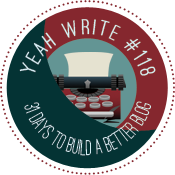One of my friends asked me recently how I manage not to go crazy living with constant pelvic pain. I don't know that I had an answer for her besides, "What else can I do?"
Today, in the process of decluttering the apartment, I came across a Scientific American magazine from March 2011. It's the only one I've held onto from that subscription, and I remembered why as soon as I saw it: its cover story is "How Minds Bounce Back: Where we get the strength to go on."
I hadn't read the article yet, so this evening I sat on my balcony and read it as the sun set. Here's the takeaway: almost everyone recovers remarkably well from traumatic events. 90% of us. The article goes into studies confirming the claim -- for example, slow-motion video of recent trauma survivors showing that, indeed, their eyes are crinkling up when they laugh, indicating that they are laughing genuinely and not out of politeness. I experienced that particular one myself when my uncle died unexpectedly a couple years ago. I climbed the stairs into my grandma's kitchen, sobbing, and hugged her, and then, a moment later, said, "You're so small!" "You're so big!" she said. And we both genuinely laughed.
Chronic stress is, of course, different from the stress of a traumatic event, so the article doesn't specifically address a stressor like vulvodynia except in this one phrase: "unrelenting grief, like clinical depression, is just too much to bear, overwhelming the mourner." That's a pretty bleak sentence, and it does apply to pelvic pain: we grieve the loss of our former bodies, for example. But I still think resilience applies in cases like ours. One point of evidence for me is that I hardly ever dream about vulvodynia. The two dreams I remember are these, and they are years old:
1. Dr. House, from the television show, said he could cure me of vulvodynia, but he was going to make me cry first.
2. My crotch turned into a jellyfish.
If I've had stress dreams about chronic pain or doctors or treatments, I don't remember them. That suggests to me that this bad stuff isn't sticking with me, even as I pass through it daily.
Within the past month, both my aunt and the family dog died. And both times, I saw resilience in the people around me. Crinkles at the corners of their eyes even as they wiped away tears. Debates about current events the first day the dog's collar hung on the doorknob. Knowing that these actions are not out of place during times of mourning helps me understand how I can cope with vulvodynia: I cope because I'm built to cope. We are built to cope.
I have a new confidence after finishing that article. Not about vulvodynia, though; all the article did was explain how I deal with it. My new confidence is about my mental illness. My entire adult life has been governed by bipolar disorder and anxiety. Challenge, failure, embarrassment. But as it turns out, I have a quiet, solid core. The two dreams I remember having about vulvodynia are punchlines. I don't know if there's a better indicator of resilience than that.

I truly appreciate how openly you share your personal journey. I always learn a lot from your posts - not just about vulvodynia (which I knew nothing about before reading your blog), but about coping with life's curve balls with grace and positivity.
ReplyDeleteKaren
Very interesting thought, that idea that we're "built to cope." We are often made of sterner stuff than we know, and it's not until we're asked to dig deeply into the very center of ourselves that we know we have it. Way to keep things in perspective when others could not, ma'am.
ReplyDeleteIt is amazing how resilient we humans can be. You sound like a real trooper. And like you said, you have no choice to be anything but.
ReplyDeleteI like the idea that we are all built to cope. Even if it seems we aren't doing that at a given time, it is still part of our nature. It makes me hopeful.
ReplyDeleteNo, no better indicator of resilience. I laugh a lot - partly to ease depression - so I understand how laughter as a way of coping.
ReplyDeleteYou are so strong. And you write so beautifully. Thank you for this!
ReplyDeletewith humor there's always hope
ReplyDeleteLove the description of true laughter, cheers to your resilience!
ReplyDelete